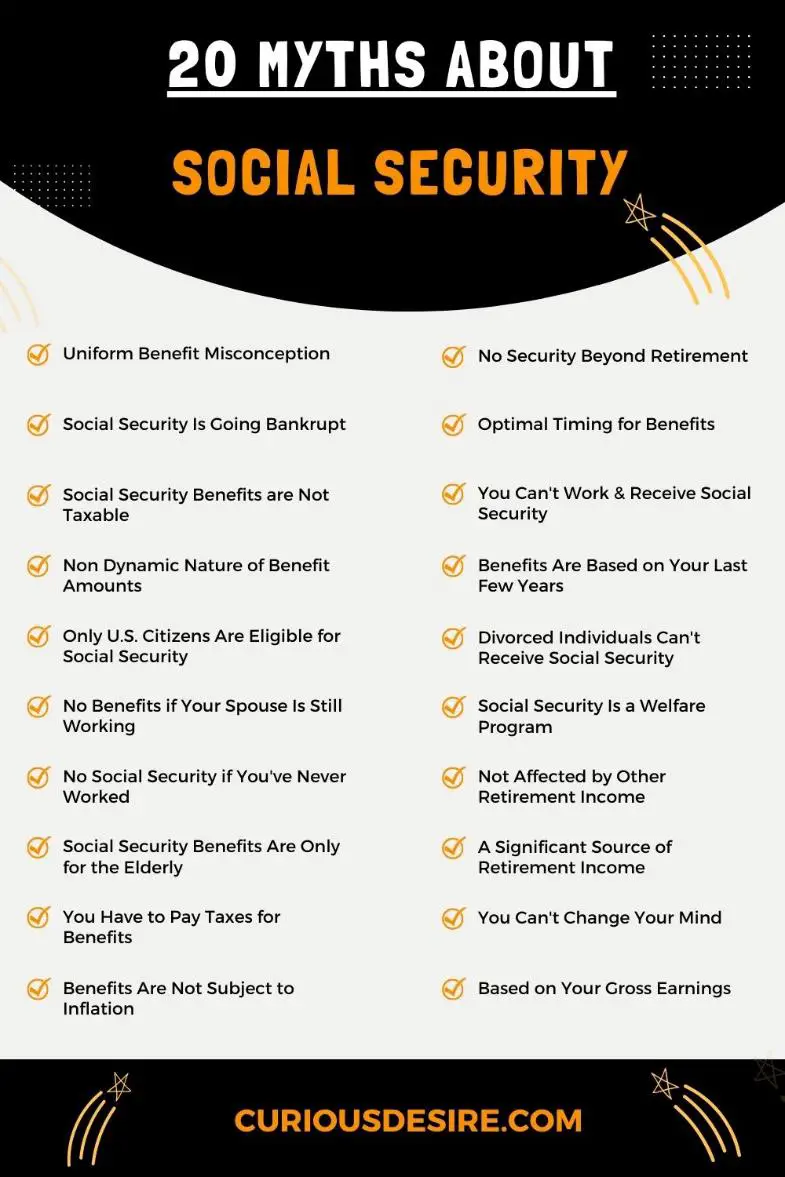Social Security is like a safety net for many people when they retire. However, sometimes, people have various misconceptions about it.
Which can make it hard for people to understand how Social Security really works.
In this article, we aim to bust some myths about Social Security. We want everyone to have the right information so they can make good choices about their money and retirement.
Here Are 5 Most Common Myths About Drinking Water:
- Social Security Is Going Bankrupt
- You Can’t Work and Receive Social Security Benefits at the Same Tim
- Social Security Benefits Are Based on Gross Earnings
- Social Security Benefits Are Only for Retirees
- Everyone Gets the Same Benefit Amount
[toc]

Myth 1: Everyone Gets the Same Benefit Amount
Why it Exists:
The common misperception that Social Security benefits are uniform for all individuals stems from a fundamental misunderstanding of the system’s mechanics.
Some people assume that the benefits remain fixed, irrespective of their individual earnings.
Debunking the Myth:
In reality, Social Security benefits are closely linked to your earnings history.
The system follows a progressive scale, meaning individuals who earn more during their working years receive higher benefits.
This design is intentional to guarantee a fair distribution of benefits.
The Social Security Administration calculates benefits using a formula that takes into account your highest-earning years.
This approach brings clarity to how your contributions translate into financial support during retirement.
Myth 2: Social Security is Only for Retirees
Why it Exists:
The term “Social Security” might give the impression that its benefits are only meant for retirees, but this overlooks its more extensive scope.
Debunking the Myth:
Contrary to the myth, Social Security benefits go beyond retirees.
The program acts as a safety net for disabled individuals and eligible family members, offering financial support during challenging circumstances.
Recognizing the inclusive nature of Social Security ensures that those with disabilities and qualifying family members can access the assistance they need, dispelling the misconception of exclusivity.
Myth 3: Social Security Will Run Out of Money Soon
Why it Exists:
Worries about the long-term financial health of Social Security have led to the belief that the system is about to run out of funds.
Many fear that the resources may not be sufficient to sustain the program in the future.
Debunking the Myth:
Despite recognizing the challenges, experts’ projections and analyses indicate that Social Security is not expected to completely run out of money.
While sustainable adjustments and reforms may be necessary to ensure its long-term viability, the program remains a crucial pillar of the social safety net.
Myth 4: You Should Always Take Social Security Benefits as Soon as You’re Eligible
Why it Exists:
The idea that it’s always best to claim Social Security benefits at age 62 might come from concerns about what will happen with the program in the future.
Debunking the Myth:
While individuals have the option to claim Social Security benefits at 62, waiting until retirement age or later means you’ll get more money each month.
Breaking this myth is about understanding your own situation—considering individual circumstances, such as health, financial needs, and longevity expectations, before making a decision.
Myth 5: Social Security Benefits are Not Taxable
Why it Exists:
Some people believe that Social Security benefits are entirely tax-free, leading to potential misconceptions about their financial implications.
Debunking the Myth:
The fact is, the taxation of Social Security benefits is subject to specific conditions.
Depending on your total income, a portion of your Social Security benefits may be subject to federal income tax.
Understanding these tax implications is crucial for effective retirement planning.
Myth 6: You Can’t Work and Receive Social Security Benefits
Why it Exists:
There is this mistaken belief that if you work while receiving Social Security benefits, it’s either not allowed or could harm your benefits.
Debunking the Myth:
The truth is, you can still work and receive Social Security benefits.
However, if you’re below the full retirement age, there are limits on how much you can earn. If you earn more than these limits, your benefits may be reduced.
The good news is that once you reach full retirement age, there are no more earning limits.
This means you can work as much as you want without affecting your Social Security benefits.
It gives people the flexibility to choose whether they want to continue working after reaching full retirement age.
Myth 7: Once You Start Receiving Benefits, Your Monthly Amount Will Never Change
Why it Exists:
Some individuals have this perception that the initial benefit amount they receive remains fixed throughout their retirement years.
Debunking the Myth:
In reality, Social Security benefits are subject to adjustments over time. Cost-of-living adjustments (COLAs) are applied to ensure that benefits keep pace with inflation.
These periodic increases are designed to help maintain the purchasing power of Social Security payments, providing recipients with adjustments to reflect the rising cost of living.
Myth 8: Social Security Benefits Are Based on Your Last Few Years of Work
Why It Exists:
There’s a common misunderstanding about how Social Security benefits are calculated. Many people think it’s based mainly on recent earnings.
Debunking the Myth:
Contrary to popular belief, Social Security benefits aren’t just about the last few years of work.
They’re calculated using the highest-earning 35 years, adjusted for inflation.
This method gives a fair picture of your earnings throughout your career, considering any ups and downs in income over time.
Myth 9: Only U.S. Citizens Are Eligible for Social Security
Why it Exists:
The myth that only U.S. citizens are eligible for Social Security may exist due to a misunderstanding of the eligibility criteria.
Misinformation, lack of awareness about specific eligibility details, or confusion between different government assistance programs could contribute to the perpetuation of this myth.
Debunking the Myth:
Social Security eligibility is not exclusive to U.S. citizens.
Certain non-U.S. citizens, including certain immigrants and refugees, may be eligible for Social Security benefits based on their work history and legal status.
Myth 10: Divorced Individuals Can’t Receive Social Security Benefits Based on an Ex-Spouse’s Earnings
Why it Exists:
A misconception may lead people to believe that divorce automatically eliminates eligibility for Social Security benefits tied to an ex-spouse’s earnings.
Debunking the Myth:
It is important to understand that if a marriage lasts for at least 10 years and specific criteria are met, individuals may be eligible for social security benefits based on their ex-spouse’s record, even if the ex-spouse has remarried.
Recognizing this opportunity allows divorced individuals to explore additional avenues for financial support in their retirement years.
Myth 11: You Can’t Collect Benefits if Your Spouse Is Still Working
Why it Exists:
The view that you can’t collect Social Security benefits if your spouse is still working might stem from a misunderstanding of the rules surrounding spousal benefits and earnings limits.
Debunking the Myth:
Even if a spouse is still working, eligibility for spousal benefits exists under certain criteria.
The working status of the spouse does not necessarily prevent the other from receiving benefits.
Understanding this aspect empowers individuals to optimize their Social Security claims and strategically plan for their retirement income.
Myth 12: Social Security Is a Welfare Program
Why it Exists:
Some individuals might not be fully aware of how Social Security operates.
Since it is a government program that provides financial support, people might mistakenly consider it welfare without recognizing that it’s largely funded through payroll taxes on workers.
Debunking the Myth:
Myth 13: You Can’t Receive Social Security if You’ve Never Worked
Why it Exists:
Social Security benefits are often tied to an individual’s work history, leading people to think they might be ineligible if they haven’t worked.
Debunking the Myth:
Social Security benefits are usually linked to work history, but there are cases where people with little or no work experience can still get support.
If you’re married to someone with a work history, you can receive spousal benefits based on their earnings.
Survivor benefits are available for spouses, children, and dependent parents of deceased workers, regardless of their own work history. This support is crucial after losing a family member.
Social Security Disability Insurance (SSDI) doesn’t depend on work history at retirement; it provides benefits to those unable to work due to a disability.
Additionally, Supplemental Security Income (SSI), a separate program, assists low-income individuals, including those with limited or no work history.
These programs ensure Social Security benefits help a wide range of people, addressing different life situations beyond just having a traditional work history.
Myth 14: Social Security Benefits Are Not Affected by Other Retirement Income
Why it Exists:
The notion that Social Security benefits are not affected by other retirement income may arise because people often prefer simple explanations, and the idea that Social Security benefits are entirely separate from other retirement income is easier to understand.
The complexities of taxation rules and provisional income calculations may not be widely known or fully grasped.
Debunking the Myth:
The truth is that the amount of money you make from other sources during retirement can impact your Social Security benefits.
Here’s how it works: If your total income, which includes money from retirement accounts and other sources, goes beyond a certain level, you might have to pay taxes on a portion of your Social Security benefits.
This is calculated using a term called “provisional income,” which considers your adjusted gross income, tax-exempt interest, and half of your Social Security benefits.
It’s also worth noting that, depending on where you live, some states may have their own rules about taxing Social Security benefits.
So, while Social Security is a valuable source of income during retirement, understanding how other retirement income can affect it is crucial for planning your finances wisely.
Myth 15: Social Security Benefits Are Only for the Elderly
Why it Exists:
People often think Social Security is only for the elderly because it’s closely linked to retirement. Since it’s widely seen as a program meant for retirees, its other purposes might get overlooked.
Debunking the Myth:
In reality, Social Security goes beyond just retirement benefits. Its eligibility criteria include people facing disability, offers benefits for surviving family members, and even assists with medical costs through programs like Medicare.
So, while retirement is a part of it, Social Security is there to help in various life situations, not just for older adults.
Myth 16: Social Security Is a Significant Source of Retirement Income
Why it Exists:
The myth of Social Security as the primary source of retirement income may stem from its pervasive role in discussions about retirement planning.
Debunking the Myth:
Social Security is an important part of retirement income, but it might not cover all expenses.
It’s a myth that relying solely on it is enough. To dispel this idea, it’s crucial to take a diversified approach to retirement planning.
People are encouraged to add other savings tools like 401(k)s and IRAs to supplement their Social Security.
This way, they can build a stronger financial plan for a comfortable and secure life after retirement.
Understanding that Social Security is just one piece of the puzzle helps in making informed decisions for a well-rounded retirement strategy.
Myth 17: You Have to Pay Taxes on All Social Security Benefits
Why it Exists:
Lots of people don’t know that you only pay taxes on Social Security benefits if your overall income goes above specific limits.
Because these thresholds aren’t widely known, many assume that taxes apply to all benefits.
Debunking the Myth:
Social Security benefits become taxable if your total income, which includes your adjusted gross income, tax-exempt interest, and half of your Social Security benefits, exceeds specific thresholds.
The IRS employs a formula to calculate the taxable portion of your Social Security benefits.
This isn’t a flat rate; rather, it varies based on your overall income level.
Additionally, it’s important to note that some states may have distinct rules regarding the taxation of Social Security benefits, and not all of it is subject to taxation.
Myth 18: You Can’t Change Your Mind Once You Start Receiving Benefits
Why it Exists:
Misunderstanding about the inflexibility of Social Security decisions may lead to the belief that once you start, there’s no turning back.
Debunking the Myth:
Under certain conditions, you have the option to withdraw your application for Social Security benefits and apply again later.
This flexibility is there, but it’s crucial to approach it with caution due to potential financial implications.
When you decide to withdraw your application, it’s like undoing your initial claim.
You need to pay back all the benefits you’ve received so far, and this could impact your overall financial situation.
So, while the option exists, it’s essential to carefully assess your circumstances and consider the potential effects on your finances before making such a decision.
Myth 19: Social Security Benefits Are Not Subject to Inflation
Debunking the Myth:
A lack of awareness about cost-of-living adjustments may lead to the belief that Social Security benefits remain static.
Debunking the Myth:
Social Security benefits undergo annual adjustments based on the Consumer Price Index for Urban Wage Earners and Clerical Workers (CPI-W).
These adjustments help to make sure that the money you get from Social Security can still buy the same things even if prices go up.
Myth 20: Social Security Benefits Are Based on Your Gross Earnings
Why it Exists:
Some individuals may misunderstand the basis for calculating Social Security benefits, thinking it’s tied to gross earnings.
Debunking the Myth:
The benefits of Social Security are calculated based on taxable earnings, which might be lower than gross earnings after considering deductions and exemptions.
It’s important to grasp this difference for accurate retirement planning.
By understanding how benefits are calculated, individuals can take a more precise approach to maximize their Social Security benefits in line with their unique financial situations.
In simpler terms, the money you get from Social Security depends on the earnings that are taxable, not the total amount before deductions.
Knowing this helps you plan better for retirement.
Social Security Myths FAQs
How is Social Security funded?
Social Security is funded primarily through payroll taxes, with workers and employers contributing a percentage of wages.
Can you receive Social Security benefits if you’ve never worked?
In some cases, individuals may be eligible for Social Security benefits based on a spouse’s or ex-spouse’s work record.
What is the full retirement age for Social Security benefits?
Full retirement age varies based on birth year but ranges from 65 to 67.
Can you work and receive Social Security benefits at the same time?
Yes, but if you are below full retirement age, your benefits may be reduced if your income exceeds a certain limit.
Is Social Security only for retirees?
No, Social Security also provides benefits for disabled individuals and survivors of deceased workers.
Can non-U.S. citizens receive Social Security benefits?
Eligibility for Social Security benefits depends on factors such as work history and legal residency status.
Is Social Security going bankrupt?
Social Security faces financial challenges, but it is not expected to go bankrupt. Adjustments may be needed to ensure long-term sustainability.
Can you lose your Social Security benefits if you work in retirement?
While working in retirement may affect the amount you receive, you won’t lose your benefits.
Do Social Security benefits increase with inflation?
Yes, Social Security benefits are adjusted annually based on the Consumer Price Index for Urban Wage Earners and Clerical Workers (CPI-W).
Can you apply for Social Security benefits online?
Yes, the Social Security Administration allows individuals to apply for benefits online.
Can you receive Social Security benefits and a pension at the same time?
Yes, but certain pensions may affect the amount of Social Security benefits you receive.

